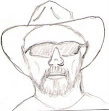He's watching you, on the sidewalk, on the street, in the intersection, in the stores. The argument goes that if you're doing nothing illegal, then you have nothing to fear. Right.
For the watchers, however, the rules seem to be somewhat different. Try to record a cop on duty, and you can face felony wiretapping charges in some states, and a felony charge of simply recording a policeman in at least three now.
Many police cars have built-in cameras on their dashboards, and some jurisdictions are looking in to having cameras mounted on the cops shoulders. These things sometimes produce useful information, such as the falling-down drunk condition of a stopped driver. On the other hand, when dubious conduct is suggested, the tapes have a way of getting lost in the evidence room.
I don't know why the sensitivity on the part of the police. After all, if you're not doing anything illegal, you have nothing to fear.
Tuesday, June 22, 2010
Subscribe to:
Post Comments (Atom)



3 comments:
Billll,
The issue about photographing police, at least in the US, is about union control.
Not to mention that pesky "freedom of speech" notion. The homily about "the pen is mightier than the sword" makes holding police up to public scrutiny quite . . um, intimidating. How could peace officers ever do their work (Ever hear the phrase "professional courtesy" about behavior that would be *legal* if they weren't "the only ones"?) if they had to labor under the burden of having their work (in public, at least) scrutinized?
Surely you understand, that you cannot have just anyone photographing and recording police officers. Why, just the act of deliberately and defiantly *observing* their behavior is going to be really, really sensitive to the process of serving the community. Especially if the camera comes out when their behavior is on dubious legal grounds (i.e., harassment, trespass, abuse of authority, intimidation, entrapment, violation of traffic laws when not in "hot pursuit", and miscellaneous of personal and community good will). As you point out, if they are doing nothing wrong, or suspicious, how could any law-abiding citizen (like most peace officers, most of the time) object?
Except it might make more work for the shop steward.
As O'Brien passed the telescreen a thought seemed to strike him. He stopped, turned aside and pressed a switch on the wall. There was a sharp snap. The voice had stopped.
Julia uttered a tiny sound, a sort of squeak of surprise. Even in the midst of his panic, Winston was too much taken aback to be able to hold his tongue.
'You can turn it off!' he said.
'Yes,' said O'Brien, 'we can turn it off. We have that privilege.'
The police in northern Virginia have something to hide.
Right-wing law-and-order types make the left-wing media look good by comparison.
Post a Comment